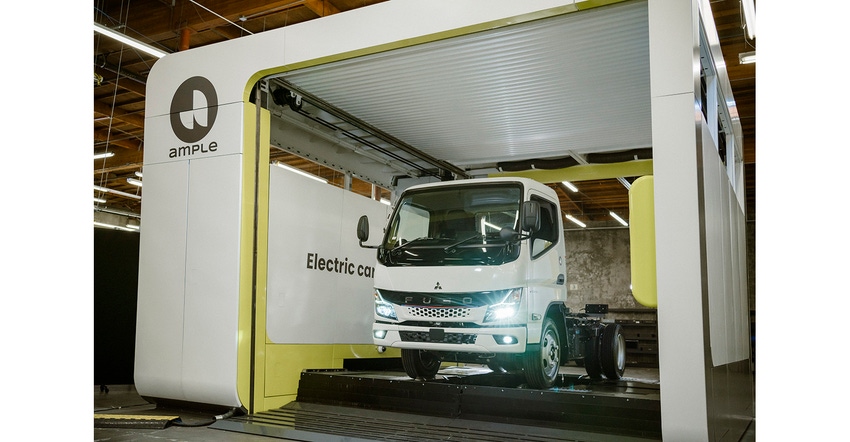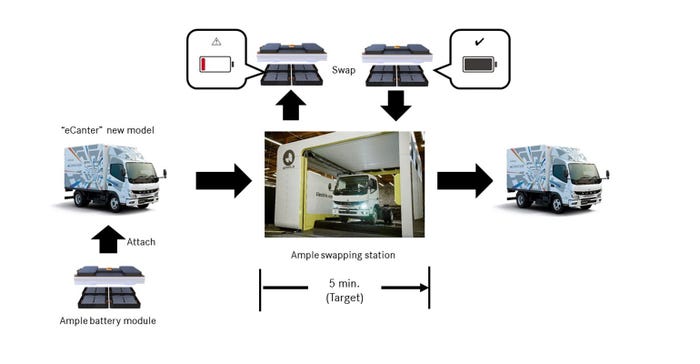Ample’s Disruptive EV Charging Solution
Ample’s CEO discusses battery-swapping technology insights and collaboration with Mitsubishi Fuso on battery-swapping technology for electric trucks.

Battery swapping for electric trucks is a solution that promises to transform the landscape of transportation and sustainability. Battery swapping technology has the potential to not only address the range limitations of electric vehicles (EVs) but also to provide a seamless and efficient experience.
Ample—a company developing battery swapping technology—recently announced a new partnership with Mitsubishi Fuso that aims to equip their electric trucks with Ample's modular battery swapping technology. Trucks will be able to swap depleted batteries for a fully charged battery in just 5 minutes using Ample's second-generation battery swapping stations.
Fleet operators won't need to pay for the infrastructure or upfront battery costs, making switching to EVs more cost-effective. The Ample’s stations are designed to provide a gas station-like experience, ensuring maximum fleet uptime while remaining affordable. The partnership will begin with deploying Ample-compatible FUSO eCanters—light-duty trucks—in Japan during the winter of 2023, addressing last-mile delivery electrification challenges and moving Mitsubishi Fuso closer to its goal of a carbon-neutral product portfolio in Japan by 2039.
In Japan, an electric light-duty truck requires around 10 hours with AC charging or a few hours with DC charging. This partnership aims to circumvent this issue, supporting vehicle uptime by delivering a full charge within minutes and encouraging the transport industry’s EV shift.

Advantages of battery-swapping for electric truck fleets
Ample CEO & Co-founder Khaled Hassounah told Battery Technology: “Battery swapping provides a wide range of benefits compared to traditional charging methods, especially for electric truck fleets.”
Let's explore some of these advantages:
Seamless transition to electric trucks: Battery swapping provides the ease of operations of gas/diesel with even more significant emission reduction than traditional EVs. Fleet operators will not have to rethink their operations to accommodate charging, as the experience represents a lateral move from gas.
Lower upfront cost: The fleet does not need to pay for the swapping infrastructure nor the upfront cost of the battery in the truck, significantly lowering the cost of switching to electric.
Greater uptime: Ample’s ability to deliver a full charge within minutes, as opposed to hours, drastically increases fleet uptime, and makes the driver more efficient.
Swapping batteries is as cheap as gas: The cost of swapping a truck’s battery will be comparable to refueling a gas- or diesel-powered truck—representing another way the experience mirrors that of a gas station.
Simultaneous loading or unloading: While a truck’s batteries are being swapped, the truck can still be loaded and unloaded, allowing for additional operational efficiencies.
Streamlined entrance/exit design: Ample’s drive-through experience will further simplify the experience for the operator of the vehicle, who doesn’t need to back out of the station at the end of a swap.
“There are 275M cars to electrify in the US alone, which will demand an all-hands-on-deck approach to technology and infrastructure. Plug-in charging works great for EV owners with private garages. At the same time, battery swapping is a more efficient and economical solution for fleet vehicles that need to get back on the road quickly, as well as city dwellers. And through our battery swapping stations, the emission benefits of electric vehicles are maximized by running them on renewable energy. Battery swapping facilitates this by charging the batteries when renewable energy is available,” expressed Hassounah.
Battery swapping safety
Hassounah emphasized the importance of creating a well-lit station that offers optimal visibility for the driver, which is crucial in making them feel secure. Moreover, keeping the station fully closed during periods of inactivity is essential to ensure its safety upon reopening.
To further enhance safety, continuous monitoring around the clock is implemented, along with readily available assistance. Additionally, the stations were designed to accommodate last-mile delivery trucks' increased height and weight when they are elevated from the platform for battery-swapping purposes.
Future milestones with Mitsubishi Fuso
Hassounah said that the initial deployments between Mitsubishi Fuso and Ample will not only contribute to further advancements in sustainable transport but also address the needs of middle and last-mile delivery use cases—which are responsible for 25-30% of emissions in towns and cities globally—by providing a gas station-like experience in terms of speed and convenience.
Furthermore, the CEO of Ample revealed that the company plays a vital role in Mitsubishi Fuso's efforts in advancing carbon neutrality and expanding mobility options in Japan's rapidly growing EV market through the development of CASE technologies (Connected/Autonomous and Automated/Shared/Electric), supporting the country's transition to 100% EV sales by 2035.
“And as we expand our partnership to fleets internationally, we’ll share more information on that,” concluded Hassounah.
About the Author(s)
You May Also Like





